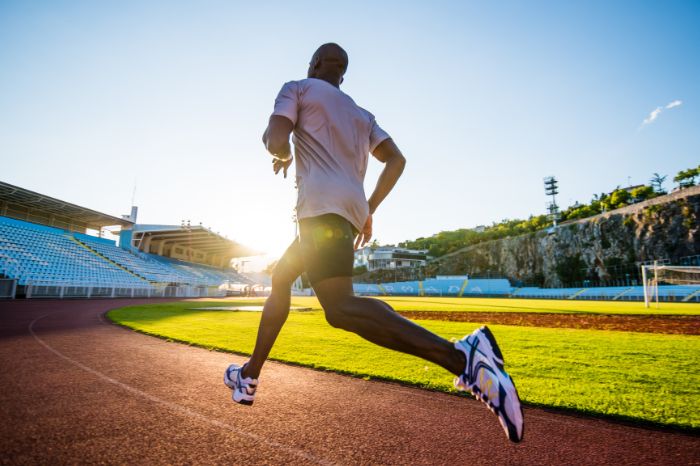- Calls to this hotline are currently being directed to Within Health, Fay or Eating Disorder Solutions
- Representatives are standing by 24/7 to help answer your questions
- All calls are confidential and HIPAA compliant
- There is no obligation or cost to call
- Eating Disorder Hope does not receive any commissions or fees dependent upon which provider you select
- Additional treatment providers are located on our directory or samhsa.gov
Understanding Orthorexia in Athletes

Have you ever felt consumed by the thought of eating the “right” foods? Diet culture has filtered through many different trends of what we “should” and “should not” eat over the decades, but the most recent seems to be what is known as clean eating.
Clean eating is a focus on non-processed, whole foods with minimal ingredients. Just like any diet trend, when we focus on the elimination of food, it quickly becomes all-consuming, elevating anxiety and harming our relationship with food. This is called orthorexia. For athletes, specifically, this may look like obsessing over what to eat before, during, and after workouts and what would fuel you “the best” for performance.
What is Orthorexia?
Orthorexia is a form of disordered eating and is not yet classified as an eating disorder. However, disordered eating can be just as harmful and dangerous for your body as an eating disorder. Eating disorders are defined in the Diagnostic and Statistical Manual of Mental Disorders as having very specific criteria. The following are the different types of eating disorders that are known to impact athletes:
- Anorexia nervosa is when the amount of food consumed is not enough to fuel the body, leaving you underweight and physically in danger. However, many athletes may exhibit restrictive behaviors and not be underweight. This is called atypical anorexia, which falls under other specified feeding and eating disorder (OSFED). Don’t be fooled by the word atypica, though; it is actually more common than anorexia.
- Bulimia nervosa is when one engages in a pattern of binge eating and compensatory behavior. Binge eating is eating a certain amount of food in a short period of time that leaves you feeling out of control, shameful, and oftentimes extremely uncomfortable. A compensatory behavior can be anything from purging, laxative use, diet pills, or exercise.
- Binge eating disorder (BED) consists of periods of binge eating without compensatory behavior. BED is actually more common than any other eating disorder and even more common than breast cancer.
Despite orthorexia not being “technically” classified as an eating disorder, it can often lead to one of the above eating disorders. Disordered eating is one of the leading factors in eating disorders. The obsession with finding “clean” foods can turn into further and further restrictions very quickly.
Why are Athletes at a Higher Risk?
Athletes are often determined and dedicated individuals. This determination does not just stay on the field. We see it in so many different factors of athletes’ lives. We often see athletes going on to be leaders in their professional lives. So why would that determination not be present when finding the “perfect” food to fuel their workouts?
Athletes also have specific sport-related pressures. For example, the emphasis on optimal nutrition for performance can create high pressure for eating the “perfect” foods. And let’s be real, so many athletes are perfectionists. So many athletes find themself falling down this path to help increase performance.
Another example is weight-class or aesthetic sports. This includes sports such as wrestling, rowing, gymnastics, or ice-skating. The emphasis that these sports put on weight and looks can create unrealistic expectations.
Some of the information within diet and wellness culture in sports stems from pseudoscience. Athletes may find themselves self-diagnosing food intolerances or lost in a sea of myths around what foods are best. This is why it is incredibly important to ensure you get proper nutrition advice from a registered dietitian.
Warning Signs of Orthorexia in Athletes
Sometimes the signs of disordered eating are hard to notice because they are often normalized as “healthy” eating. However, it is important to remember that what’s best for you may not be best for someone else.
Emotional Signs
If you notice an increase in anxiety around food or guilt for eating certain foods you may classify as “unclean,” this may be an indicator that you could be struggling with orthorexia. You may also notice shifts in mood such as irritability, loneliness, or depression.
Behavioral Signs
Behavioral signs of orthorexia often exist as ritualistic behaviors around food, such as having extreme rules around food. These can be anything from needing to cut your food into tiny pieces, having exact times for meals, or not eating in front of others.
Performance and Health Signs
Physical symptoms or performance decline can be a sign of orthorexia. You may notice extra fatigue, feel exhausted more easily, and take longer to recover from a workout. There is also often an increase in injuries and longer recovery from coming back from injury due to malnourishment.
Symptoms show up differently for each person. For example, two people can engage in the same restrictive eating patterns, and one will lose their period, and another will have labs out of the normal range. One person may lose a significant amount of weight, and another may get a stress fracture. No one symptom defines how severe or dangerous disordered eating can be, and no one symptom can define how sick you are. If you are struggling with disordered eating, it’s important to seek help.
Prevention
Orthorexia does not happen for just one reason. Yes, diet culture is a major factor; however, if it were the only factor, everyone would have an eating disorder. Genetics, socioeconomic factors, and psychological factors all play a role in eating disorders and disordered eating. Preventing orthorexia in athletes requires a good understanding of relationships that can exacerbate eating disorders.
Coach-Athlete Relationships
The relationship between a coach and an athlete has been shown to increase the risk of developing an eating disorder if there is tension. This is why educating coaches about eating disorders and disordered eating is so important. Coaches need to be informed on how to talk to their athletes about all things food and body. This includes avoiding numbers and calories, focusing on aesthetics, and increasing communication around fueling enough and shifting body talk to what our body can do for us rather than how it looks.
Creating a positive team environment that does not focus on diet culture but focuses more on flexibility and how to care for our bodies in a sports environment is important.
Team dynamics are often too focused on mushing through injury and too rigid around the sport. This creates an environment where we learn to ignore our bodies and create rules on how to be, whether it is how much to work out, what type of workout, or what and when to eat.
Everybody is different, and no matter how much you may be told there is a perfect formula to getting faster or stronger, that formula does not work for every person. Especially as a student athlete, life takes over, exams happen, lack of sleep, or just a long day. So many factors play into how your body responds to stress, and having the flexibility to shift your schedule, take a rest day, or eat an extra snack can be the missing piece to peak performance.
Final Thoughts
At the end of the day, the more you focus on having the perfect food regimen, the more likely it is that it will negatively impact performance. Yes, nutrition has a time and a place, and eating enough is a key ingredient to being the best athlete you can be. However, if you find your anxiety increasing when it comes to deciding when and what to eat, you may be on your way to developing orthorexia.
Despite how alone you may feel, over 70% of athletes struggle with disordered eating. So look at your team, be vulnerable, increase the conversation, and see how you can support each other.
The opinions and views of our guest contributors are shared to provide a broad perspective of eating disorders. These are not necessarily the views of Eating Disorder Hope, but an effort to offer a discussion of various issues by different concerned individuals.
We at Eating Disorder Hope understand that eating disorders result from a combination of environmental and genetic factors. If you or a loved one are suffering from an eating disorder, please know that there is hope for you, and seek immediate professional help.

Kate Ringwood is a licensed professional counselor and owner of Serendipity Counseling Services. She focuses on helping athletes through their struggles with food, body, and performance. Kate specializes in working with folks through their own unique journey as they navigate their relationship with their sport through eating disorder recovery.

